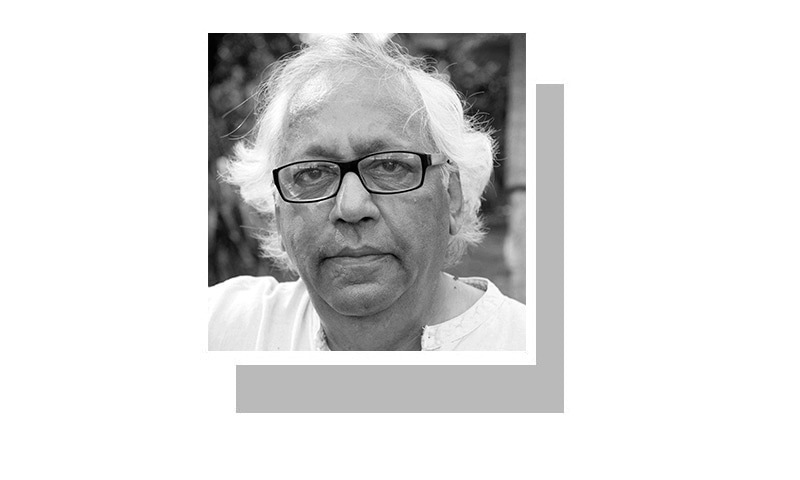THE price of writing so often and for so long is that when somebody mentions a recent column, I often have no recollection of what I wrote about.
Older readers might sympathise with me and my occasional brain fog, but this is the curse of advancing years. When facing a blank computer screen and wondering what to write about, there are times when an idea hits me, accompanied with a vague recollection that I may have written about it at some point in the past.
Also read: Year of the fog
So I can only ask readers to indulge me if I occasionally repeat myself. After this longish preamble, let me introduce Raza Kazim to those who haven’t had the privilege of meeting him. Raza, one of the most brilliant lawyers in Pakistan when he was practising, is a true Renaissance man, with a wide range of interests. Some of them have turned into a passion that borders on obsession. Raza has also been a political activist, and his opposition to the establishment has occasionally landed him in jail.
A few years ago, he explained his ‘halva theory of economics’ to me in his rambling house in Lahore. Basically, Raza argues that given the nature of Pakistan’s economy, we have only kept afloat as a result of regular dollops of manna from heaven.
Know more: China lends $1bn to Pakistan to boost plummeting forex reserves
This first took the shape of the evacuee property scam that surfaced in Pakistan very soon after Partition. In that period, thousands of refugees from India arrived with property documents, and little else. Claiming equivalent property that had belonged to Hindus who had fled to India was a cumbersome process, and the desperate refugees sold their claims and documents to opportunists who then acquired prime property for peanuts. Thus were many early fortunes made.
Regular dollops of manna may have helped us stay afloat.
Our next stroke of luck came with the distant Korean War that began in 1950. Suddenly, there was a huge demand for jute from East Pakistan for the sandbags needed by UN forces. Needless to say, most of this bonanza went to industrialists in West Pakistan who owned the jute mills.
Explore: ‘US wants to help Pakistan protect its economy’
Soon after the Korean War ended, Pakistan signed up to Cento and Seato, two American-led anti-communist pacts. This gave us access to modern American arms worth millions of dollars, and encouraged our leaders to think that they could defeat India.
After the disastrous 1965 and 1971 wars came the sharp rise in oil prices that fuelled a demand for construction workers in the Middle East. To take advantage of this boom, Zulfikar Ali Bhutto ordered the simplification of the issue of passports, allowing tens of thousands of workers to get building jobs. Their remittances buoyed an economy that had been hard hit by the loss of foreign exchange caused by the loss of the jute industry in East Pakistan.
Read more: 40 years of Zia and the far-reaching repercussions of the 1977 military coup
Then came the Afghan war begun in 1979 with the Soviet invasion of our neighbour. President Carter’s offer of $2 billion in aid was rejected by Gen Zia as ‘peanuts’, but when Ronald Regan became president, he loosened the purse-strings, and billions flowed in, together with new weaponry.
However, when the war ended with the pullout of Soviet forces a decade later, relations between Pakistan and the US had soured due to our nuclear programme. Military assistance was cut off, and economic aid slowed to a trickle. There was much talk of Pakistan having been ‘used and discarded’. And when Pakistan tested a nuclear bomb in 1998, the roof caved in, and we became international pariahs.
The 9/11 attacks against America saved our economy from collapse, and the manna fell from heaven as never before. Suddenly we were not only America’s blue-eyed boys, but Musharraf became Bush’s ‘tight buddy’. Many loans were written off, grants were handed out, and shiny new weapons arrived by the shipload.
But the gravy train had to stop at some point. Over the years, as the American-led Nato occupation of Afghanistan dragged on with mounting casualties, Pakistan was urged to ‘do more’. With Islamabad’s foot-dragging and denials that followed American demands, a realisation grew in Washington that America was being taken for a ride. Politicians and the media turned increasingly hostile, and Pakistan’s image abroad became tarnished.
Now we seek other sources of halva, but China and Saudi Arabia are proving tougher patrons. While neither demands improvements in our human rights record — how could they, after all? — they aren’t giving us any freebies. No Eid gifts from Riyadh or Beijing, sadly.
So while we think of China’s CPEC initiative as a windfall, the fact is that loans will have to be repaid, and Chinese private investors will demand their pound of flesh. How we will find the foreign exchange to pay for all the ambitious projects in the CPEC portfolio is something we should be worrying about.
So let’s wait for the next regional crisis to grab some more free halva.
Published in Dawn, January 19th, 2019















































